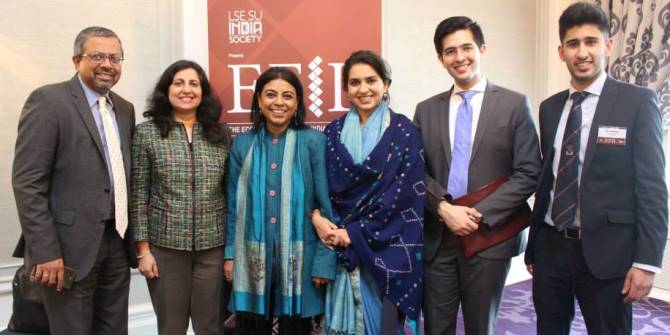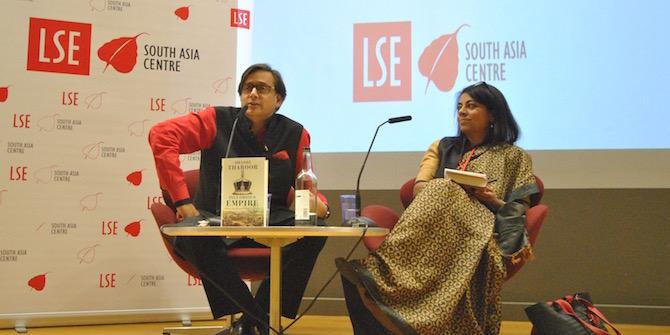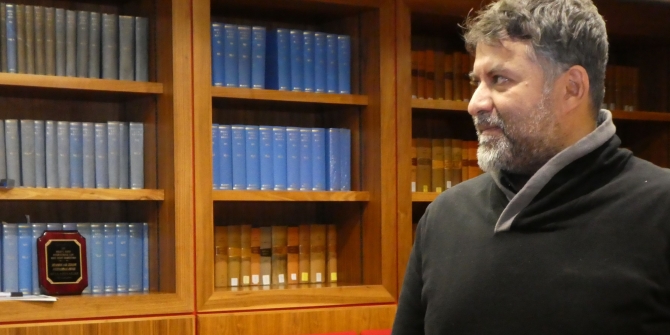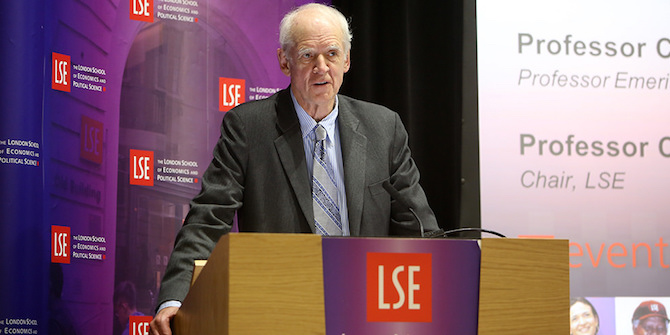The recent Economic Forum for India at LSE included a stimulating and heated panel discussion on politics featuring Raghav Chadha, youngest official spokesperson of the Aam Aadmi Party. Vandinika Shukla caught up with Mr Chadha for a conversation on the challenges for new political parties in an established democracy, tensions within top leadership of AAP, and issues taking prominence in public debate across India.
What are the opportunities and challenges AAP faces as a nascent political party in India?
AAP encounters three challenges. Firstly, to continuously remain viable and present a viable option to the electorate. Secondly, to always project and do different things. It’s important for us to appear as a different party, not just a stereotype BJP, Congress, Samajwadi or a BSP. Lastly, we face challenges of organisation, innovation, funding- all of which need to be transparent and set new bench marks in property and propriety. We are a small and very new party and are working towards better systems and processes; and we hope we can meet these challenges as we go along.
You moved from chartered accountancy to politics, what motivated this career shift into politics at such a young age? What does it mean to be the youngest spokesperson in a political environment largely dominated by figures over 50?
I never had the aspiration of joining politics. I had the aspiration of working for my country. I was associated with the anti-corruption movement towards its last leg, when the party was being incorporated. At this point too, I believe I am an activist working for a cause. AAP is not a political party per se, it is still a movement which has certain objectives and offers a space for people like me. I don’t come from a particular family or socio-economic background. I am a regular middle class boy who got an opportunity to serve the country. I think this speaks volumes about the kind of internal democracy we have. The AAP recognises merit and gives opportunity to people.
Let’s take the example of a TV debate. The panelists representing the different political parties are all over fifty, and on the other hand you have a 26 year old boy who has the ambition and vision to change the country with his own thoughts to share. That glimpse of a TV screen, albeit in a very minimal sense, represents change. That is the kind of change we need to bring.

One of the most significant criticisms shot at the AAP, especially after Arvind Kejriwal’s resignation in 2014, was that this activism did not translate into governance. How do you respond to that today?
We were branded immature to govern and politically naïve. That was a valid criticism up to a certain time. But even in 49 days we showed that we deliver what we promised. This time we have laid down a blueprint for Delhi. We’re not simply saying we are anti-corruption crusaders, vote for us. We have laid down a blueprint for Delhi, and people have recognised, seen and challenged that blueprint. The citizens of Delhi have recognied that AAP is not a group of idealistic people but that we know what we are saying and how to govern the city.
On allegations of being a political novice, I think that’s our advantage. We don’t do stereotypical shrewd politics and politics of corruption or communalism. Our central idea is to think out of the box. We want to get better and more robust solutions to the problems of people. AAP follows a very participatory approach and so we want to make sure people are important stakeholders in the way policies are drafted. This idea of people in politics differentiates us from other political parties and has led to the creation of the Delhi Dialogue Commission (DDC).
AAP has been at the center of attention for recent internal differences and rifts within the party. How are they impacting AAP’s image amongst the populous? And how will this dissent within top party leadership impact overall cohesion and stability of the party?
Every party has clash of ideas, in AAP’s case it has been highlighted by the media and attached with sensationalism. The media’s attempt to portray AAP as any other party has perhaps done some damage to the party’s perception and hurt sentiments of certain volunteers. There are forums where these issues will be appropriately addressed, but I don’t see this impacting the governance of AAP’s government in Delhi or our organisational abilities.
Dissent means that AAP has the ability and courage to entertain dissent and hear voices of those who hold different opinions. That’s a distinctly different from other parties like Congress and BJP where you are simply asked to leave if you question party leadership.
AAP has been written off many times; when we formed the party, while contesting elections, etc. Resignation in 2014 was called the demise of AAP. But every time we bounce back and we emerge stronger and this time we will also come out strong and a force in the Indian political scenario.
Women’s rights and safety have assumed importance in the world’s development agenda and are specifically relevant for India. Keeping in mind that you were at a UN women panel on ‘Assessing priorities for Women in the Union Budget’, what is AAP’s opinion on the 2015 Union budget with respect to women’s rights?
The latest budget has resulted in sharp social sector spending cuts which is a very worrying sign. Allocations to Ministry of Women and Child care as well as Health and Welfare along with social security schemes like Mid-day meals, ICDS, Sarva Siksha Abhiyan etc. have seen sharp cuts. This government has clearly not undertaken gender responsive budgeting this year. We have been highlighting our concerns in appropriate forums.
Women’s security has been central to public debate, yet this Government has not come up with a concrete plan or appropriate budgetary allocation. Only Rs.1000 Crore were allocated to the Nirbhaya fund. Furthermore, nobody knows what happened to the previous Rs.2000 Crore allocation; if news reports are to be believed not a single penny from it has been spent. Just allocating money for the sake of it does not serve the purpose. We need to ensure women’s safety is a priority and action is taken.
The mindset of patriarchy, of treating one gender as royalty and another as inferior, held by a certain section of the society needs to be governed. AAP in Delhi, in fact, did a women’s dialogue which laid down a detailed blueprint of how we will ensure empowerment, equal opportunity, safety and security for women. It includes granular detail, for example installation of CCTV cameras, Bus Marshalls and security agents in public transport, 100% street lighting for Delhi, and applications so women in distress can instantly connect with security agencies. We are now working towards these solutions and the finances required. Yet, in order to achieve gender sensitisation, we must correct education curriculum such that the concept of equality is ingrained within students right from the start.
Are there any structural changes that the AAP has taken to encourage more women in politics?
In the last Delhi elections, out of the 70 assembly members three were women, all from AAP. This time, six were women, all again from AAP. So as the anecdotal evidence suggests, AAP absolutely stands for more participation of women in politics, we stand resolutely with the 33% representation in Parliament as well. If you closely go through our manifesto, every dialogue has encouraged women’s participation. However, this needs to be done at a large level. Simply offering reservations is not enough, the mindset needs to be changed and obstacles systematically addressed.
There is no reservation policy within the political party. But the AAP Shakti Group, led under the leadership of Lalita Ramdas, is a robust outfit of the party that is continuously in touch with central leadership of the party. This group regularly brainstorms ideas and suggestions, which are appropriately addressed.
Note: This article gives the views of the interviewee, and not the position of the India at LSE blog, nor of the London School of Economics. Please read our comments policy before posting.
About the Authors
 Raghav Chadha is the youngest official spokesperson of the Aam Aadmi Party. After completing his schooling at Modern School Delhi, Raghav trained to be a chartered accountant and finally completed his studies at the London School of Economics. Only 26, he has been involved with the AAP party ever since its formation in 2012. He is part of the party’s think tank, and is the face of AAP on prime time TV debates.
Raghav Chadha is the youngest official spokesperson of the Aam Aadmi Party. After completing his schooling at Modern School Delhi, Raghav trained to be a chartered accountant and finally completed his studies at the London School of Economics. Only 26, he has been involved with the AAP party ever since its formation in 2012. He is part of the party’s think tank, and is the face of AAP on prime time TV debates.
 Vandinika Shukla is an MSc International Relations student at LSE. Her fields of interest include public policy, economic development, gender equality in decision making and international politics. She is a Khemka scholar and the G(irls)20 Summit Indian Ambassador, and tweets @vandinika
Vandinika Shukla is an MSc International Relations student at LSE. Her fields of interest include public policy, economic development, gender equality in decision making and international politics. She is a Khemka scholar and the G(irls)20 Summit Indian Ambassador, and tweets @vandinika








AAP IS ONLY AN ALTERNATIVE POLITICAL PARTY WHICH CAN WRITE OFF THE TRADITIONAL POLITICS AND CAN MAKE OUR MOTHERLAND FREE TO BECOME A TRULY REPUBLIC INDIA ………
As our Motherland is the oldest and richest in cultural heritage the level of corruption AND DIVISIVE POLITICS became intolerable for Her. That’s why ALMIGHTY have created AAP which will ultimately nail down divisive politics and the politics backed by money and muscle power of the crony mafias and capitalists. That’s why, despite of heinous efforts to disrupt communal harmony in Trilok Puri, Bawana, vandalising Churches and so on, Delhi refused to become a Muzaffarnagar of UP only because of AAP-FACTOR………….
AAM AADMI PARTY PREACHES transparent and clean politics and the is the campaigner of Jan Lokpal and “Swaraj”. When more and more SWARAJ will be established the public representatives will have to be accountable to AAM AADMI, the ultimate beneficiaries, lesser will be the chances of corruption which will bring more and more selfless people into politics.This will reverse the vicious circle of TRADITIONAL POLITICS and ALTERNATIVE POLITICS along with PARTICIPATORY DEMOCRACY will begin a new era. Actual Acche Din will get its momentum.
ULTIMATELY ONE DAY WILL COME THAT “KRANTI” WILL PREVAIL ALL OVER INDIA…………………..